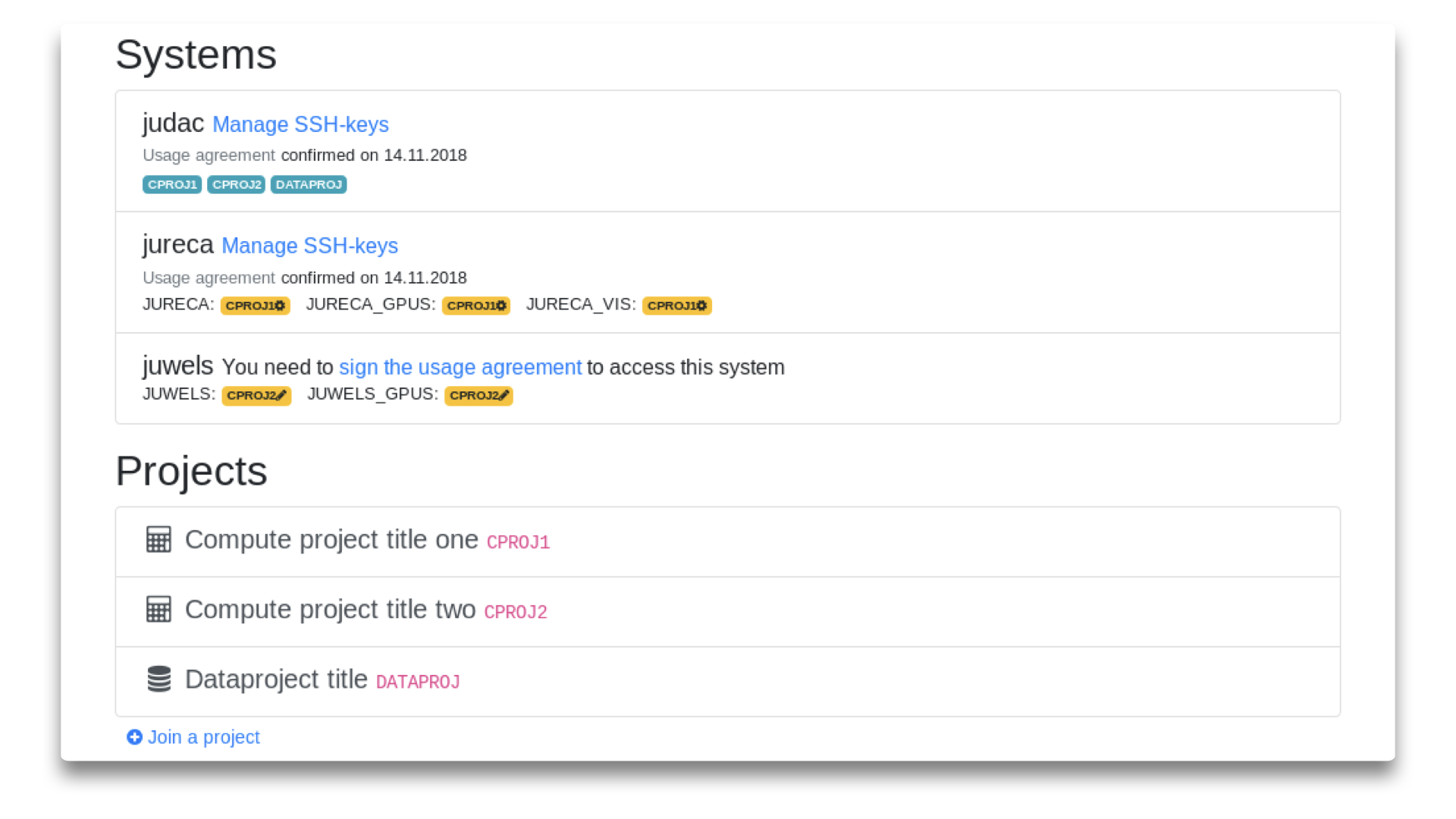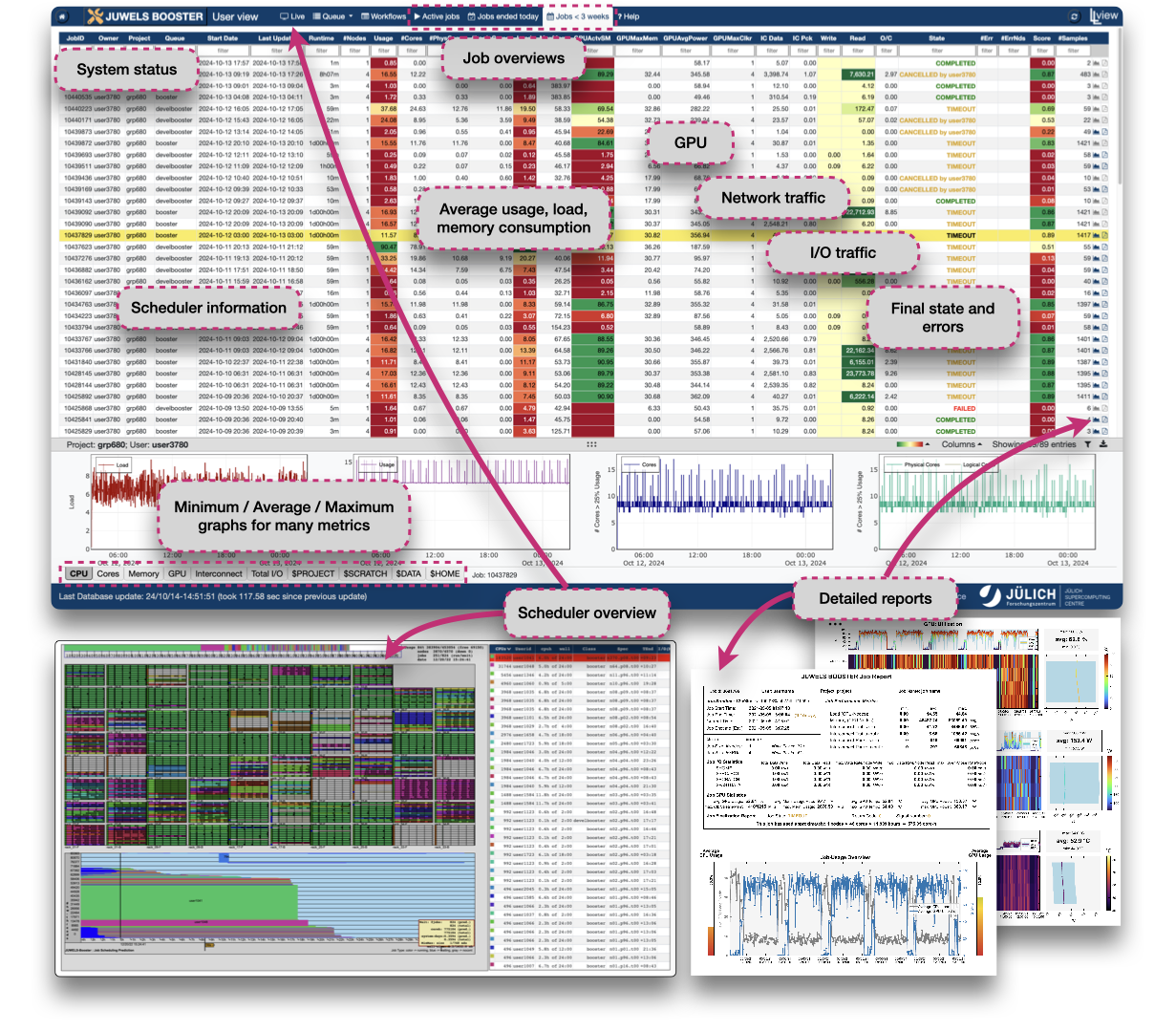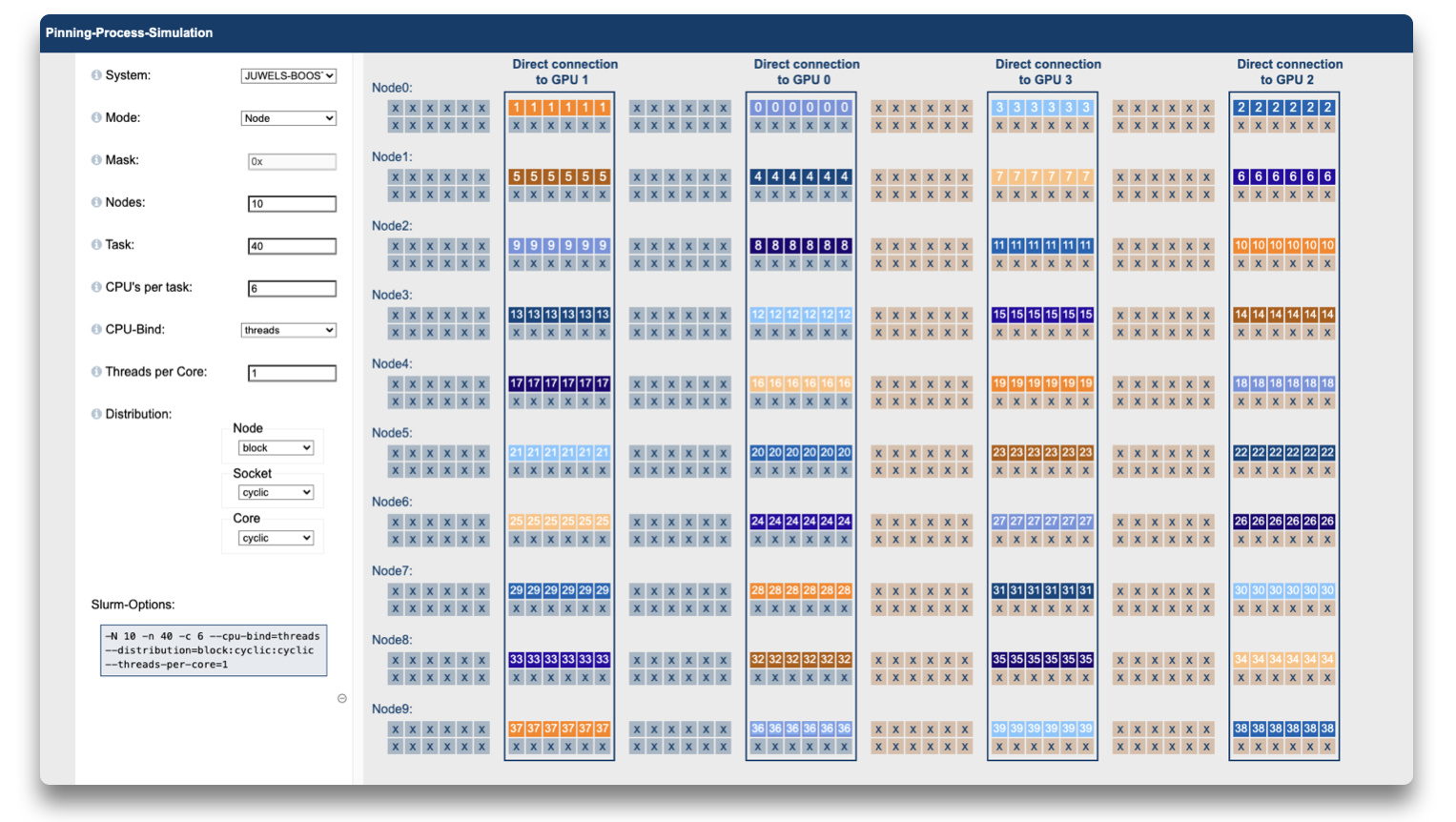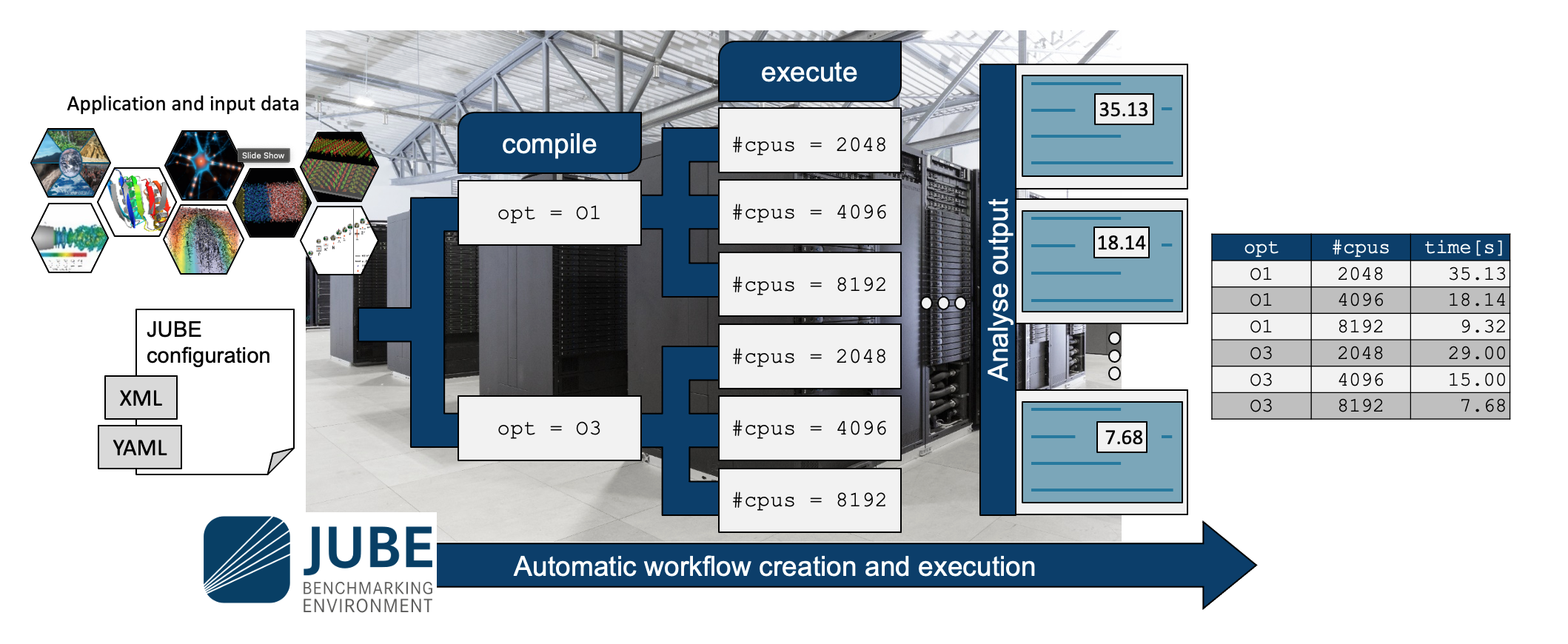JSC Tools
This page lists the tools developed and used at JSC.
JuDoor

JuDoor is the main entry portal for the users at JSC, a single point to manage their personal data, the access to the systems and services, as well as their account and project memberships. It also provides detailed quotas, budget and statistics for the projects and file system usage.
Status Page

The Status Page provides the user with an overview of the current state of all systems at JSC. Clicking on a system shows details about the current state of the according system. The detailed view also lists recent events as well as planned events like e.g. a maintenance.
Note
Most of the content within the status page is not backed by automated monitoring. While we try to provide insights into current incidents as soon as possible, there may be short delays between impaired functionality noticeable for users and the information about it being visible on the status page.
Notifications
The Status Page has support for notifying users via email or browser notification.
Mail
To automatically receive status updates via email, you can subscribe via the “Mail Subscriptions” tab in the top navigation bar. After logging in, for each service you can configure whether you want to be notified for events on that service at all. If you decide to subscribe to a service, you can also choose the minimum severity of events you would like to get notifications for. You will not get mails for events with lower severity than the selected one. Additionally, you can select whether you also want to get mails when events receive updates. For example, this may be the case when a maintenance needs to be extended beyond its originally planned end.
Browser
User can also be notified when the health of a service changes via the browser. This can be done by activating the browser notification using the bell icon on the bottom-right of the page. When active and the status page is open in a tab, a notification will then be emitted by the browser when there is a status change of a service.
Message of the Day (MOTD)
The content of the status page is integrated into the MOTD (the initial message shown at SSH login). Therefore, current events added in the status page of a particular system will be shown when logging into that system. This information is synchronized with the content from the status page every 5 minutes.
LLview Job Reporting

LLview Job Reporting provides valuable information for the user.
LLview is a platform to monitor clusters that are controlled by a resource manager and a scheduler system. Within its Job Reporting module, it provides detailed information of all the individual jobs running on the system. To achieve this, LLview connects to different sources in the system and collects data to present to the user via a web portal. For example, the resource manager provides information about the jobs, while additional daemons may be used to acquire extra information from the compute nodes, keeping the overhead at a minimum, as the metrics are obtained in the range of minutes apart. The LLview portal establishes a link between performance metrics and individual jobs to provide a comprehensive job reporting interface.
Pinning Tool

The Pinning Web Tool, developed at JSC, gives the user a graphical visualization for the different processor affinities on the systems.
JUBE Benchmarking Environment

The JUBE benchmarking and workflow environment provides a script-based framework to easily create reproducible benchmarks of applications or complex workflows, execute them on different computer systems and evaluate the results. It is actively developed by JSC.
User tool jutil
The tool jutil can be used to manage different projects in the system environment and querying information about the account and connected projects.
Usage
jutil [-h] <subcommand> <action> [<options>][-v][-o <format>]
Available subcommands
Subcommand |
Description |
|---|---|
person |
Queries persons |
user |
Queries users |
project |
Queries projects |
env |
Prepares the environment |
Available actions
Action |
Description |
|---|---|
show |
Query info for users or projects |
projects |
List of projects that a user is member of |
cpuquota |
Query CPU quota |
dataquota |
Query disk quota |
activate |
Activate a project -> exports env vars and change current unixgroup |
Available options
Option |
Description |
|---|---|
-A <val> --budget=<val> |
Filter results with given budget account ID |
-C <val> --contingent |
Query only research projects (with contingent) |
-c <val>, --contpart=<val> |
Query a contingent partition |
-D <val>, --data |
Query only data projects (without contingent) |
-E <val>, --end=<val> |
Search jobs until this end date |
-g <val>, --group=<val> |
Specify project or (primary) group |
-h, --help |
Print this help message |
-k <val>, --pkey=<val> |
Specify personal key |
-L <val>, --last=<val> |
Search jobs for specified recent period |
-M <val>, --members |
Show data quotas from all project members |
-n <val>, --noheader |
Do not print output header |
-o <val>, --format=<val> |
Output format: rows(default),columns,parsable,json |
-p <val>, --project=<val> |
Specify project |
-R <val>, --reservation=<val> |
Exports Slurm env vars for given reservation |
-S <val>, --start=<val> |
Search jobs from this start date |
-s <val>, --system=<val> |
Query cpuquota only for given system |
-U <val>, --units=<val> |
Specify project |
-u <val>, --user=<val> |
Specify user |
-v, --verbose |
Show more info/logs |
-Z, --currsys |
Query cpuquota only for current/local system |
Allowed user interfaces
jutil person show [-u <uid>|-k <persKey>|-a] [-o <fmt>] [-n] [-v]
jutil user show [-u <uid>|-a [--global]] [-o <fmt>] [-n] [-v]
jutil user projects [-u <uid>] [--contingent|--data] [-o <fmt>] [-n] [-v]
jutil user cpuquota [-u <uid>|-a] [-p <project>] [-s <sys>|-Z] [-c <contpart>] [-A <budget>] [-o <fmt>] [-n] [-v]
jutil user jobs [-u <uid>] [-J <id>|[-p <proj>] [-c <cp>] [-A <bg>] [-L <lst>|-S <dt> -E <dt>]] [-o <fmt>] [-n] [-v]
jutil user dataquota [-u <uid>|-a] [-p <project> | -g <group>] [-U <units>] [-o <fmt>] [-n] [-v]
jutil project show -p <project>|-a [-o <fmt>] [-n] [-v]
jutil project cpuquota -p <project> [-s <sys>|-Z] [-c <contpart>] [-A <budget>] [-o <fmt>] [-n] [-v]
jutil project dataquota -p <project> [--members] |-a [-U <units>] [-o <fmt>] [-n] [-v]
jutil env activate -p <project> [-A <budget>] [-R <resv>] [-v]
jutil env init [-v]
jutil env refresh [-v]
jutil env dump [-v]
jutil env cleanup [-v]
UNICORE access
The UNICORE software is installed on all production systems at JSC. You can find usage information for users of different user communities at the following location(s):
BLABLADOR documentation
Blablador is the Large Language Model (LLM) server of the Helmholtz Foundation. You can access it via the website, or via the API as described on the documentation.